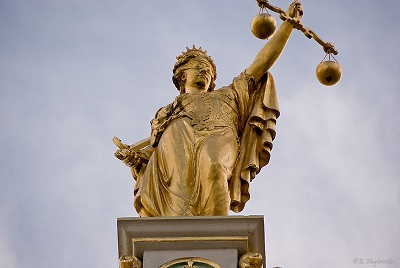Justice is a moral rightness based on ethics, law, rationality and equality for all. In a political sense, it is a demonstration of the inalienable right of equal protection before the law, without discrimination based on sex, orientation, religion, ethnicity or age.
of equal protection before the law, without discrimination based on sex, orientation, religion, ethnicity or age.
The concept of justice has three main facets: 1) interpersonal adjudication, 2) law based on fault, and 3) due process.
Interpersonal adjudication just illustrates that justice is based upon rights and duties of the individual.¹ Justice is interpersonal in that it is the resolution of conflict between individuals. Between persons, justice consists of upholding right behaviour and the courts can adjudicate between persons.¹
When law is based on fault, no personal is ever disadvantaged or punished except for fault: which is the golden thread that runs through the fabric of the legal order.¹ The whole of common law for crimes, civil and property rights is characterised by the ideal that fault is what underlies punishment.¹
Due process mean that everyone has an inalienable right to not be disadvantaged except according to rules of procedure and evidence established by law, which ensures a fair trial.¹ This emphasis on procedure also protects the liberties associated with criminal process such as the right not to be imprisoned or held without trial, the right to be informed of charges and the right to be presumed innocent until proven guilty.¹
Reference:
1.Cooray, Mark. The Concept Of Justice. Retrieved from http://www.ourcivilisation.com/cooray/btof/chap182.htm
Image Credit: Wikimedia Commons
© BrainMass Inc. brainmass.com July 26, 2024, 8:50 pm ad1c9bdddf